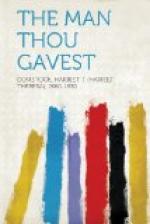They were home at last in old William Truedale’s quiet house. Conning went upstairs with Ann. Generally Lynda went with him to kiss Ann good-night before they bent over Billy’s crib beside their own bed. But now, Lynda did not join them and Ann, starry-eyed, prattled on about the play and her joy in her father’s achievement. She was very quaint and droll. She ran behind a screen and dropped her pretty dress, and issued forth, like a white-robed angel, in her long gown, her short brown curls falling like a beautiful frame around her gravely sweet face.
Truedale, sitting by the shaded lamp, looked at her as if, in her true character, she stood revealed.
“Little Ann,” he said huskily, “come, let me hold you while we wait for mommy-Lyn.”
Ann came gladly and nestled against his breast.
“To think it’s my daddy that made the splendid play!” she whispered, cuddling closer. “I can tell the girls and be so proud.” Then she yawned softly.
“Mommy-Lyn, I suppose, had to go and whisper the secret to Billy,” she went on, finding as usual an excuse instead of a rebuke. “Billy’s missed the glory of his life because he’s so young!”
Another—a longer yawn. Then the head lay very still and Truedale saw that she was asleep. Reverently he kissed her. Then he bore her to the little bed behind the white screen, with its tall angels with brooding eyes. As he laid her down she looked up dreamily:
“I’m a pretty big girl to be carried,” she whispered, “but my daddy is strong and—and great!”
Again Truedale kissed her, then went noiselessly to find Lynda.
He went to their bedchamber, but Lynda was not there. Billy, rosy and with fat arms raised above his pretty blond head, was sleeping—unconscious of what was passing near. Truedale went and looked yearningly down at him.
“My boy!” he murmured over and over again; “my boy.” But he did not kiss Billy just then.
There was no doubt in Truedale’s mind, now, as to where he would find Lynda. Quietly he went downstairs and into the dim library. The fire was out upon the hearth. The gray ashes gave no sign of life. The ticking of the clock was cruelly loud; and there, beside the low, empty chair, knelt Lynda—her white dress falling about her in motionless folds.
Truedale, without premeditation, crossed the room and, sitting in his uncle’s chair—the long-empty chair, lifted Lynda’s face and held it in his hand.
“Lyn,” he said, fixing his dark, troubled eyes upon hers, “Lyn, who is Ann’s father?”
Lynda had not been crying; her eyes were dry and—faithful!
“You, Con,” she said, quietly.
During the past years had Lynda ever permitted herself to imagine how Conning would meet this hour she could not have asked more than now he gave. He was ready, she saw that, to assume whatever was his to bear. His face whitened; his mouth twitched as the truth of what he heard sunk into his soul; but his gaze never fell from that which was raised to his.




